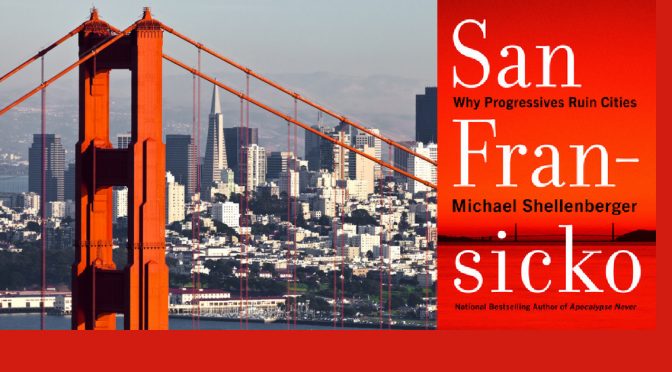Michael Shellenberger’s book San Fransicko: Why Progressives Ruin Cities came out on October 12, 2021. The author is a veteran activist and advocate of progressive policies, but he’s concluded they aren’t working in San Francisco. He blames the homelessness problem in west coast cities on widespread mental illness, drug addiction and bad policy, not on mild weather or the numerous other reasons cited by homelessness advocates.
Shellenberger casts a wide net to gain a perspective based upon a diversity of viewpoints. His book combines personal experience, deep research and numerous interviews with policy experts; individuals of various races and political persuasions; formerly homeless and incarcerated individuals; homeless advocates and relatives of those living in the streets. He recommends a new policy, Cal-Psych, which would replace the failed program from Proposition 63 (on Mental Health) and come up with a new plan for conservatorships, voluntary and involuntary mental health and addiction treatments.
His plan is bold, but is it too late? Will severely ill, violent, drug-addicted offenders be able to submit to treatment? We hope San Francisco can go back to the beautiful city it once was, but the transition will be difficult. If anything, “San Fransicko” should be a warning to other cities not to follow the lead of San Francisco. However, it appears that many Californians are also revolting against the drug-enabling policies of the Bay Area and the state.
Quality of Life Issues
The author loves San Francisco, but he points out that certain behaviors of the city’s homeless population — public defecation, open drug use, open drug markets, assaults and looting — cannot be tolerated. He faults certain institutions, using public and private funds to allow and promote this debacle – the Harm Reduction Coalition, Housing First, Drug Policy Alliance, the ACLU and groups committed to ending “the war on drugs.” The motives may be good, especially with Housing First, but the outcomes are bad. There’s no accountability demanded from recipients of aid, because they’re considered victims.
In contrast, European venues which decriminalized drug use, places like Amsterdam and Portugal, force addicts into treatment and don’t have the same problems.
Shellenberger asks: Is it humane and altruistic for the city to have let 713 people die from drugs last year? That rate is much higher than the rate of COVID deaths and much higher than most cities. (Since COVID-19 isn’t likely to spread outdoors, the homeless population may be less susceptible to it.)
History and Other Cities
Shellenberger looks at historical research to show that the cost of housing, poverty and racism are not the principal causes of homelessness and violence. He attributes rises in homicide to political unrest and political belief. Walgreens recently announced that it will close five more stores in San Francisco, because of theft. The Bay Area was hit by a string of high-profile lootings last week. If he researched further, he would know that drug use is intimately connected to all kinds of violence, including homicide. In fact, the recent robberies in Oakland targeted pot stores where there was at least one shooting.
Seattle and Portland are comparable to San Francisco in policy, Shellenberger maintains. The author describes what happened in Seattle and the CHOP district last year. (Read our article illustrating what was happening in Portland during the same time period.) Thirty percent of San Francisco’s homeless population was homeless before they came to the city. A filmmaker in Seattle, Christopher Rufo, interviewed for Shellenberger’s book, did a video on the causes of homelessness.
Shellenberger doesn’t put the blame exclusively on homeless policy, because criminal justice policy is part of it. A new District Attorney who refuses to prosecute what he considers petty theft and minor crimes. Some onus belongs to Proposition 47, which turned felonies into misdemeanors, and Proposition 63. He doesn’t mention Proposition 64 which legalized marijuana, but we believe it is the largest contributor to the homelessness problem. A 2016 survey of the homeless in Seattle, revealed that 10% of them moved to Seattle for the legalized marijuana.
Although New York is so much bigger, its problems are not the same because the east coast is so much more regulated and less libertarian than the west.
Does Shellenberger fully understand the drugs?
Unfortunately, he makes a distinction between hard drugs and other drugs. In the late ‘90s, Shellenberger worked for the Drug Policy Alliance, which aims to legalize all drugs. Today’s marijuana is infinitely stronger today than it was back then; “dabs” and “vapes” addict young people today as quickly as heroin and fentanyl. There’s no reason to call it a “soft drug.”
What we know and what he does not say is that a large proportion of mentally ill homeless people wouldn’t have become disabled had they never used drugs. The book gives the account of a violent attack of an innocent victim by Austin Vincent, a drifter from upstate New York, describing it as a psychosis fueled by methamphetamine. Vincent’s behavior was very similar to that of people we’ve heard of experiencing marijuana-induced psychosis.
He correctly attributes the bulk of this homelessness to addiction and mental illness. More than half of the homeless have one or the other, or both. Shellenberger doesn’t clarify what the science says, that severe mental illness often emerges only after marijuana and other drug use begins. We need drug prevention, not promotion.
As Christine Miller, PhD. explains so well in a recent podcast, those with psychosis or schizophrenia who don’t use drugs at all, are much less likely to become violent.
Preventing the start of drug use would solve our addiction and mental illness epidemics. While rehabilitation is possible, no treatment program is guaranteed to work. Some people must go through rehab multiple times, but relapse again and again.
San Fransicko: Why Progressives Ruin Cities is an excellent political and sociological book. The author is the founder and president of Environmental Progress, a research organization in Berkeley. He proves himself capable of revising opinions when the evidence changes.


